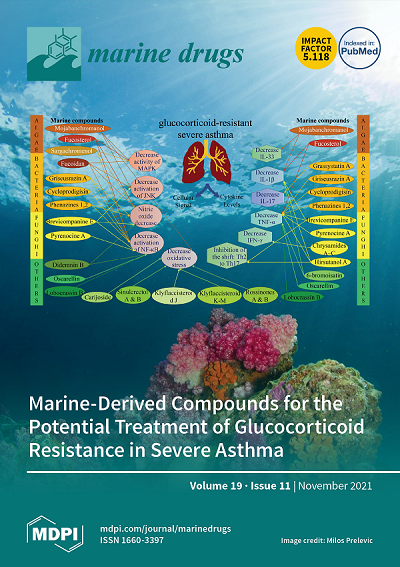Preparation and Vasodilation Mechanism of Angiotensin-I-Converting Enzyme Inhibitory Peptide from Ulva prolifera Protein
IF 4.9
2区 医学
Q1 CHEMISTRY, MEDICINAL
引用次数: 0
Abstract
Ulva prolifera, a type of green algae that can be consumed, was utilized in the production of an angiotensin-I converting enzyme (ACE) inhibitory peptide. The protein from the algae was isolated and subsequently hydrolyzed using a neutral protease. The resulting hydrolysate underwent several processes including Sephadex-G100 filtration chromatography, ultrafiltration, HPLC-Q-TOF-MS analysis, ADMET screening, UV spectrum detection test, molecular docking, and molecular dynamic simulation. Then, the ACE inhibitory peptide named KAF (IC50, 0.63 ± 0.26 µM) was identified. The effectiveness of this peptide in inhibiting ACE can be primarily attributed to two conventional hydrogen bonds. Additionally, it could activate endothelial nitric oxide synthase (eNOS) activity to promote the generation of nitric oxide (NO). Additionally, KAF primarily increased the intracellular calcium (Ca2+) level by acting on L-type Ca2+ channel (LTCC) and the ryanodine receptor (RyR) in the endoplasmic reticulum, and completed the activation of eNOS under the mediation of protein kinase B (Akt) signaling pathway. Our study has confirmed that KAF has the potential to be processed into pharmaceutical candidate functions on vasoconstriction.从莼菜蛋白中提取血管紧张素-I-转化酶抑制肽的制备方法和血管舒张机制
莼菜是一种可以食用的绿藻,被用于生产血管紧张素-I 转换酶(ACE)抑制肽。从藻类中分离出蛋白质,然后用中性蛋白酶进行水解。水解产物经过了 Sephadex-G100 过滤层析、超滤、HPLC-Q-TOF-MS 分析、ADMET 筛选、紫外光谱检测试验、分子对接和分子动力学模拟等多个过程。随后,鉴定出了名为 KAF 的 ACE 抑制肽(IC50,0.63 ± 0.26 µM)。该肽对 ACE 的抑制作用主要归功于两个常规氢键。此外,它还能激活内皮一氧化氮合酶(eNOS)的活性,促进一氧化氮(NO)的生成。此外,KAF 主要通过作用于内质网中的 L 型 Ca2+ 通道(LTCC)和雷诺丁受体(RyR)来提高细胞内钙(Ca2+)水平,并在蛋白激酶 B(Akt)信号通路的介导下完成对 eNOS 的激活。我们的研究证实,KAF具有加工成药物的潜力,对血管收缩具有候选功能。
本文章由计算机程序翻译,如有差异,请以英文原文为准。
求助全文
约1分钟内获得全文
求助全文
来源期刊

Marine Drugs
医学-医药化学
CiteScore
9.60
自引率
14.80%
发文量
671
审稿时长
1 months
期刊介绍:
Marine Drugs (ISSN 1660-3397) publishes reviews, regular research papers and short notes on the research, development and production of drugs from the sea. Our aim is to encourage scientists to publish their experimental and theoretical research in as much detail as possible, particularly synthetic procedures and characterization information for bioactive compounds. There is no restriction on the length of the experimental section.
 求助内容:
求助内容: 应助结果提醒方式:
应助结果提醒方式:


